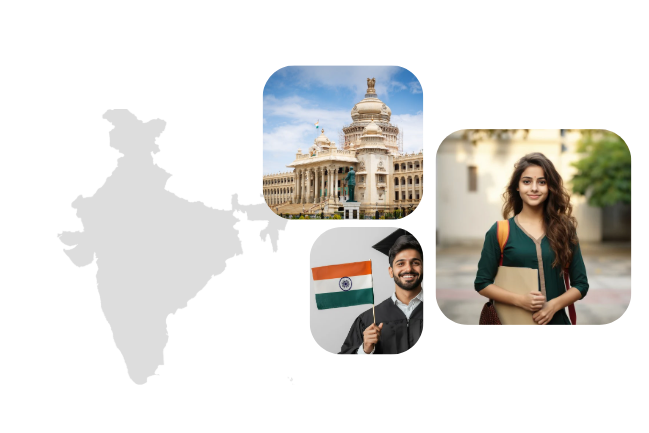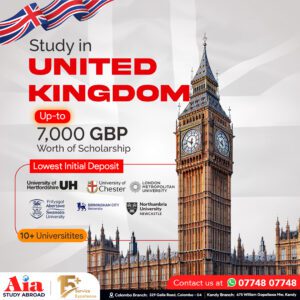Why Study in India?
India is a global hub for education, combining rich cultural heritage with affordable and highquality academic programs. Known for its excellence in fields such as engineering, medicine, IT, business, and the arts, India attracts international students seeking diverse learning experiences and unique cultural exposure. Home to prestigious institutions like the IITs, IIMs, and AIIMS, India also offers a vibrant and dynamic campus life. With affordable living costs and a wide range of scholarships, India is an ideal destination for higher education. AIA supports students from university selection to visa processes and settling in.

Key Facts to Study in the India
Language Spoken
Hindi, Tamil, Malayalam, Telugu, English and various regional languages
Cost of Study
INR 200,000 – 1,000,000 per year
Exams Required
IELTS, TOEFL (for English-taught programs) *If required
Degrees
Bachelor’s, Master’s, and PhD
Intakes
June/July (main intake) and January/February (secondary intake)
Best Cities
Delhi, Mumbai, Bangalore, Hyderabad, and Chennai
Scholarships
Students can reduce the financial burden with these scholarship opportunities:
Get Free Expert Assistance
Cost of Study in India
The average cost of living in the India for international students is approximately €12,000 to €15,000 per year, depending on the city and lifestyle.
Undergraduate Degrees:
INR 200,000 – 700,000 per year
Postgraduate Degrees:
INR 300,000 – 1,000,000 per year
| Type of Expense | Cost(Annual Average) |
|---|---|
| Accommodation | INR 5,000 – 20,000 |
| Food and Groceries | INR 3,000 – 8,000 |
| Transport | INR 1,000 – 3,000 |
| Miscellaneous | INR 3,000 – 5,000 |
Post-Study Work (PSW) and Job Opportunities
India’s growing economy provides numerous opportunities for international graduates in sectors like IT, healthcare, engineering, and business.
India offers a unique blend of modern education and cultural richness, ensuring a wellrounded learning experience for international students.
Key Job Sectors: Information Technology, Pharmaceuticals, Engineering, Business, and StartupsWhatApp us your Questions

| Job Sector | Average Starting Salary |
|---|---|
| Engineering | 300,000 – 800,000 |
| Healthcare | 500,000 – 1,200,000 |
| Information Technology | 400,000 – 1,000,000 |
| Business & Management | 400,000 – 900,000 |
| Business & Management | 300,000 – 600,000 |
Checklist for INDIA Student Visa Documentation
- Valid Passport: Must be valid for at least six months with at least two blank pages.
- Completed Visa Application Form: Fill out the online application form on the Indian government’s visa portal.
- Passport-Sized Photos: Two recent photographs meeting Indian visa photo requirements.
- Admission Letter: Official admission letter from an Indian institution recognized by the Government of India.
- Visa Fee Receipt: Proof of payment for the visa application fee.
- Proof of Educational Qualifications: Copies of your academic transcripts, certificates, and diplomas.
- Health Certificate: Medical certificate confirming you are in good health and free from contagious diseases.
- Student Visa Application Endorsement: Required from your institution or embassy, *if applicable.
- Police Clearance Certificate (PCC): For long-term courses, submit a PCC from your local police station.
- Flight Itinerary: Proof of travel plans to and from India.
Ensure all documents are properly organized and verified before submitting your application.
FAQs – India
Popular fields include Medicine, Engineering, Business Administration, and Arts, with affordable tuition fees.
Apply for a student visa after receiving admission confirmation from a recognized Indian institution. Proof of funds and a valid passport are required.
Part-time work is generally not permitted on a student visa, but internships related to your course are allowed.
India offers quality education, cultural richness, and proximity to Sri Lanka, making it a cost-effective option.
